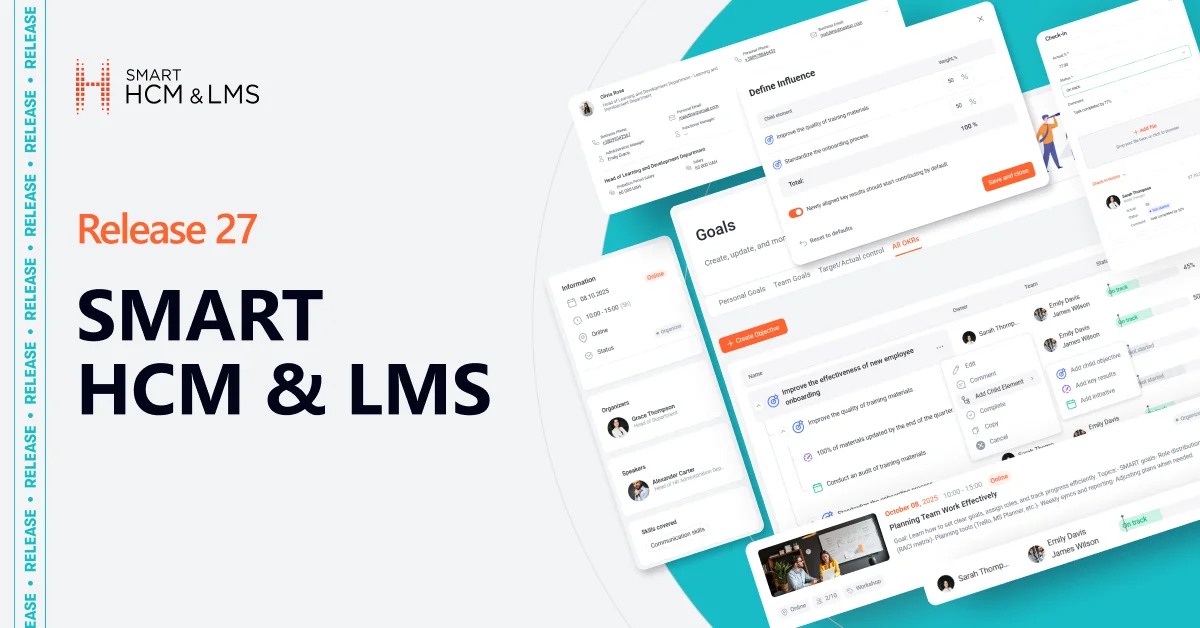On October 5, 2024, Ivano-Frankivsk gathered leading HR specialists, managers, opinion leaders, speakers from the educational sphere, etc. for the tenth anniversary HR for Business conference. SMART business took part in the conference for the second time as a partner of the event. The event has long become a platform for exchanging experience in human capital management and a place to find new ways to adapt business to current challenges in the labor market. This year, the topics of discussion were united under the general title “Insight Workshop”. As part of the workshop, experts shared practical experience on the role of leaders in a modern company, the impact of the demographic situation in Ukraine on the personnel market, the “hunt” for talents in the context of their shortage and the importance of cooperation between educators and businesses. Following up on the event, we’re outlining these and other local challenges for employers and the role of modern technologies in overcoming them.
Assessment of the situation in the Ukrainian labor market and how to strengthen the attraction and development of talent
Today, it is impossible to consider current business issues in Ukraine without addressing the topic of the war, which has radically changed key processes related to the labor market. The impact of the war affected the demographic situation, the activity of employers and candidates, as well as calls for a change in job search guidelines.
Many companies are forced to adapt to new realities, optimizing their business processes through the introduction of new technologies. This factor creates a demand for employees with the appropriate deep knowledge and skills. As a result, the need for upskilling and reskilling of personnel has increased, because upskilling allows specialists to master modern technologies and methods necessary for effective work in today’s conditions. At the same time, reskilling allows workers to change their professional direction, which is critically important for those who have lost their jobs due to a reduction or change in market needs, such as the retraining of women for “male” professions.
Interesting statistics: according to data provided by robota.ua, in 2024 the gender ratio of job seekers is 48% women and, accordingly, 52% men. And according to the survey results, 85% of women say they are ready to take “male” positions. Of these, 95% are interested in training, which will help them master the skills for “male” vacancies.
Therefore, it is especially important today to implement mechanisms for reskilling and upskilling, allowing specialists to quickly adapt to new professional requirements and labor market trends. As the speakers of the event noted, today it is more financially profitable for a company to retain, train and retrain its specialist than to find a new one. Therefore, companies should actively strengthen in this direction. This is exactly the solution for strengthening that SMART business offers. The comprehensive HR system SMART HCM & LMS allows you to implement training activities that meet the needs and level of training of each specialist. This is especially important for people who may need additional support or retraining, such as veterans adapting to new working conditions or women moving to new professions within their company. Thus, SMART HCM & LMS becomes a favorable digital environment where every employee gets equal chances for development and career growth without any obstacles.
At HR for Business, experts also shared data, without understanding which today’s employers find it extremely difficult to maintain stability and adapt their strategies to the new reality. As it turns out, employers around the world cannot find enough specialists with the necessary skills. This is due to the following factors:
- Demographic shifts: in many countries, the population is aging, and the number of active workers is decreasing. This indicator creates a deficit in certain industries, since there are not enough young specialists to fill all the vacancies. For example, the most popular vacancies in Ukrainian cities in 2024 are sales assistants, production workers, drivers, cooks, accountants. But, for example, in Dnipro, you can add to this list the demand for specialists in the armed forces and the State Emergency Service, due to the strategic location of the city and its role in the country’s defense infrastructure. In addition, there is a growing need for rescuers due to restoration work and ensuring the safety of the population. The popularity of these professions indicates how the labor market responds to the changes in politics, society, demography and the economy. The demand for these specializations also reflects the importance of basic services, adaptation to the challenges of war and the need to quickly restore key industries.
- The gap between education and the labor market: the modern education system often does not keep up with the rapid changes in the labor market, and graduates do not always have the skills that are critical for employers. This trend is becoming another important reason for the need for upskilling and reskilling of specialists within companies. Therefore, candidates will be more attracted to the employer who creates favorable conditions for such a professional level-up.
- Global competition for talent: with the globalization of markets, talent mobility has also increased. Today, companies compete for the best workers regardless of their geography of residence. This factor creates additional pressure on local labor markets, where experienced specialists migrate in search of better conditions.
- War and geopolitical instability: in the case of Ukraine, military actions have led to mass migration of the population and the reformatting of the economy. The loss or change of jobs, the relocation of specialists, the mobilization of part of the population and the destruction of infrastructure significantly changed the balance between supply and demand in the local labor market.
As we can see, the global trend of excess demand over supply is not only a problem for Ukraine. But it is worth noting that the Ukrainian labor market has fully recovered in 2024 and even exceeded the pre-war period in terms of the number of vacancies. At the same time, the job market has entered a phase of stability, as there are currently no significant fluctuations in the number of vacancies. Such observations speak of both positive and negative phenomena. On the plus side:
- Restoration of confidence in the labor market: an increase in the number of vacancies indicates a gradual recovery of the economy and business activity. This is a sign that companies are ready to invest in personnel and develop their projects.
- Expansion of opportunities for job seekers: an increase in the number of vacancies creates more opportunities for employment, choice of workplace, working conditions and career growth.
- Stability: the market’s transition to a phase of stability after a period of serious upheavals indicates that businesses are adapting to new conditions and reducing risks for job seekers and employers.
- Increased competitiveness: the recovery in the number of vacancies contributes to the competition of employers for talent, which contributes to the improvement of working conditions and wages.
At the same time, the disadvantages, based on the above observations, include the following:
- Shortage of qualified personnel: a rapid market recovery leads to a situation where demand for certain professions exceeds supply, which makes it difficult to find highly qualified professionals.
- Slow economic growth: despite stability, the lack of significant growth may indicate that the economy has not yet entered a sustainable development trajectory and still needs investment and stimulation.
- Problems with matching vacancies to the needs of job seekers: a stable market does not always mean that all vacancies meet modern needs and working conditions, which leads to a decrease in the level of talent attraction.
- Difficulties for small businesses: competition for talent is disadvantageous for small companies with limited resources to attract specialists.
The expectations of candidates from employers were also presented based on a comparison of the results of surveys conducted in 2023 and 2024. More than half of the respondents noted that the social mission of the company is important to them, indicating the presence of identity and responsibility of the company. It is important for specialists to feel belonging to an organization with clearly defined values and goals. The feeling of contributing to something important can become a motivational factor that reduces staff turnover and increases the level of engagement. Additionally, 5 more main criteria were identified when choosing an employer by job seekers:
- Salary
- Flexible work schedule.
- Career growth opportunities.
- Transparent employment.
- The ability to work remotely.
As you can see, flexibility took an important place in the list of criteria. Thanks to the SMART HCM & LMS solution, employers can effectively meet this need. The functionality of the solution includes powerful tools for automating training, goal setting and developing specialist competencies. The system promotes career growth and allows you to personalize the development of each employee of the company. Users can independently generate online requests for training or absence. SMART HCM & LMS has flexible integration capabilities with a number of other solutions that promote even greater autonomy and self-organization of employees within one consolidated ecosystem. In addition, the Manager Portal ensures the creation, coordination and convenient tracking of the implementation of individual development plans. Managers can clearly track the progress of their teams and ensure the implementation of planned activities from anywhere in the world.
How can understanding demographic signals and external factors influencing the talent market save a business from a crisis?

Strategic planning for HR today is a key tool that allows companies to adapt in time, prevent crises and predict future challenges. Analysis of demographic changes, labor market trends and other external factors helps to build a long-term HR strategy that supports business development even during periods of significant changes.
Demographic analysis is the most important strategic planning tool for companies in Ukraine. In the context of modern socio-economic challenges, such as war, migration, economic instability and population aging, the ability to correctly interpret demographic signals allows HR specialists to effectively respond to changes and prevent possible difficulties.
However, it was noted at the conference that one of the problems faced by Ukrainian businesses is a limited understanding of the impact of external factors on the organization. Often, managers are focused on the internal processes of the enterprise and do not take into account global or political changes that can have a serious impact on their existence. This phenomenon is due to the lack of sufficient external expertise, typical for managers, in contrast to experienced capitalists. Managers, as a rule, have a “short-sighted” vision, focusing on the current situation within the organization: the efficiency of personnel, internal processes, financial results and the implementation of plans. This is logical, since they are responsible for the operational management of the enterprise. However, due to this approach, managers may overlook important external factors, such as political changes, economic crises, demographic trends or other social shifts that can radically change the conditions for doing business. Capitalists, on the other hand, look at business from a more global, strategic perspective. They take into account a wide range of external factors: the political situation, changes in legislation, geopolitical risks, labor market trends, economic cycles, etc. To become more far-sighted, Ukrainian businesses need to use tools that allow them to make high-quality forecasts and analyze data on external and internal factors of influence. This allows them not only to respond to current changes, but also to carefully prepare for upcoming challenges.
SMART HCM & LMS becomes an important assistant for HR specialists in this process, because the system provides the ability to collect, analyze and interpret data on the company’s human capital, changes in the hiring environment, employee qualifications, etc. Here’s how it works:
- Analytics for predicting labor market trends: SMART HCM & LMS helps collect data on personnel, their qualifications and consider changes in the labor market in the company’s strategies. This allows you to predict a possible personnel shortage and identify the need for retraining and adapting personnel to new requirements.
- Tools for optimizing internal processes: the system helps to plan the processes of recruitment, training and development of personnel in advance, considering possible changes in economic and social conditions.
- Personnel churn management: the system can track how many employees have left the company over a certain period. This allows you to assess the stability of the team and the presence of problems with retaining employees. The data collected can be analyzed not only by general indicators, but also taking into account various factors, which allow you to accurately identify the causes of high staff turnover. This is important for identifying weaknesses in the company’s HR strategy. The solution allows you to analyze data in detail using different criteria in terms of numbers, age, positions, departments, development and training plans.
- Hyper-personalization of the employee experience: through detailed analysis of employee data, the solution allows you to create individualized strategies for interaction and development of each employee: individual training plans, real-time performance assessment. The solution will help in creating flexible reward schemes that reflect the unique needs and merits of each employee. By analyzing information about employee behavior patterns, HR can develop personalized programs to increase engagement, such as individual gamification approaches, various types of interactive training or additional benefits. HR analytics provides data on available career paths, taking into account the current level of development, potential and results of the specialist’s previous activities. In addition, based on the collected data, HR analytics allows you to take into account such factors as desired work schedules, working conditions or specific tasks that meet the personal interests of employees.
What is more important – the expectations of the company or the employees? How to build a two-way dialogue to ensure effective interaction between all parties
The modern labor market poses a double challenge to companies: on the one hand, organizations expect high competence, adaptability and responsibility from employees. On the other hand, employees have their own expectations regarding the employer’s competencies. And it’s not just about the timely payment of wages. Today, talents expect much more from companies:
- Safety in all its manifestations – this is both physical and emotional safety, stability of working conditions and confidence in the future. For example: arrangement of shelters in the office building, introduction of flexible work schedules to minimize risks, provision of psychological support, conducting training on overcoming stress.
- Transparency and clarity – people want to understand how key decisions are made, how their work affects the business and what development prospects are available to them. The Goal Setting module in SMART HCM & LMS can significantly help with this, because it helps to clearly align the individual goals of employees with the goals of the company.
- Guarantee of development – specialists strive not only to complete tasks, but also to grow professionally, acquire new skills and see a clear career path.
- Fairness – fair and objective performance appraisal, adequate compensation and equal opportunities for all are important aspects of long-term relationships with an employer. Performance Management tools in the SMART business solution automate employee performance appraisal processes, helping to clearly identify strengths and areas for improvement, and ensures the opportunity to provide objective feedback.
- Inspiration and leadership – employers who are open, supportive of employees and demonstrate their vision, motivate and create an environment of trust. SMART HCM & LMS can also help leaders with this, supporting employee engagement and creating a dynamic environment for achieving high results. For example, the Gamification module helps to introduce game elements into the work process, such as points, badges, levels and ratings, or other distinctions. This motivates employees to achieve goals and complete tasks, turning routine duties into interesting and competitive activities. Thanks to this, the company can create an individual incentive system, where achieving results leads to certain rewards or new career statuses.
All these expectations form a new level of interaction between the organization and its employees, where two-way dialogue and collaboration become the basis for successful cooperation. Transparency, support, fairness and development become key elements of the corporate culture. This involves following these steps:
- Demonstrated leadership and clarity of requests – referring to the ability of managers to be active and open in communication, take responsibility for the processes in the organization and demonstrate an example that employees can follow. Demonstrated leadership does not just mean management, but the ability to inspire, motivate and involve the team in achieving common goals. In the context of clear requests, demonstrated leadership consists of the following points:
- Explaining expectations: leaders not only voice what the organization wants, but also explain why it is important and how it relates to the overall strategy.
- Honest communication: open dialogue, where the manager can not only express a request, but also hear feedback from employees, promotes trust and mutual understanding. Feedback tools in SMART HCM & LMS allow managers to create transparent channels for two-way communication.
- Demonstrating confidence: leaders show that they are ready to support their employees and accept challenges, even difficult ones. This sets the tone for team interaction. Here, too, the solution from SMART business comes to the aid of leaders, since the system allows them to promptly pay attention to the achievements and difficulties of their employees to provide accurate support based on up-to-date data. This creates an atmosphere of confidence and stability.
- Eliminating problems: If employees see that the manager is not afraid to make difficult decisions and solve complex issues, this creates a culture of mutual respect.
- Feedback and reaction to it: employees want to be heard. Collecting feedback only has an effect when the organization is ready to respond to the signals received, otherwise it causes disappointment.
- Workload optimization: overloading or under-engaging employees undermines their motivation. Therefore, leaders must be able to balance the workload of teams to maintain their effectiveness.
However, to create an optimal balance, it is HR specialists, who often take on the role of leaders, who must be able to effectively allocate their own resources. After all, an HR leader stuck in routine tasks first needs to optimize their daily processes. This will allow them to focus on a more important aspect of their work – people. In this case, the automation of processes – such as vacancy management, CV parsing, creating candidate profiles, mailing management, etc. – is an important step towards increasing the efficiency of all teams. SMART HCM & LMS provides HR specialists with powerful tools that automate daily recruiting and talent management processes, freeing up valuable resources for working with people.
Remember that by creating conditions that meet the expectations of your employees, the company not only forms a strong team, but also ensures long-term success. After all, motivated and satisfied people become the engine of business development. Order a consultation and find out what benefits your company will receive with SMART HCM & LMS!



